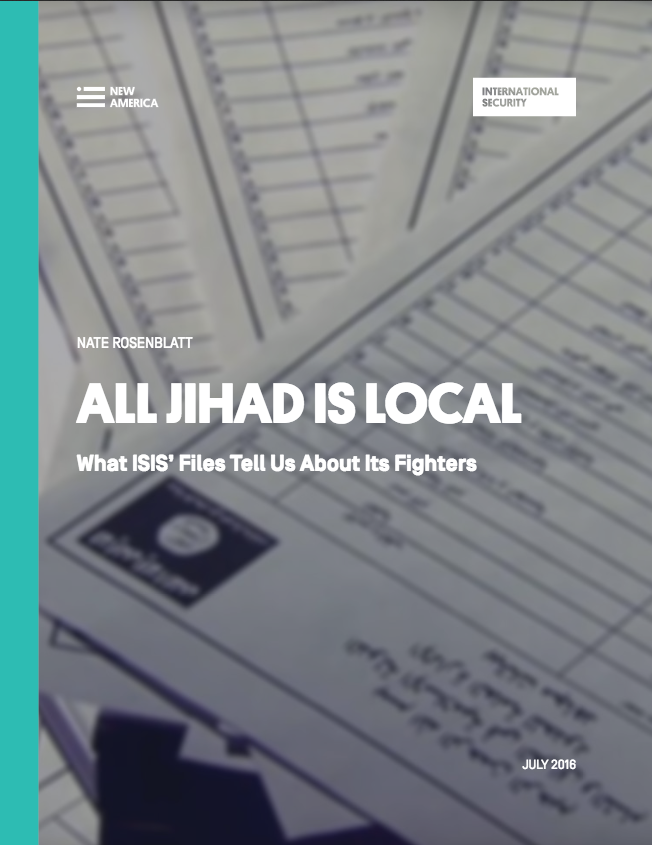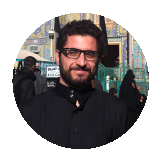 Some interesting research datasets relating to who joins ISIS have been published by Nate Rosenblatt. They make interesting reading alongside other research into the motivations and profiles of who are the most likely candidates for extremist radicalization. The data was supplied by an ISIS defector so of course must be assessed with that in mind.
Some interesting research datasets relating to who joins ISIS have been published by Nate Rosenblatt. They make interesting reading alongside other research into the motivations and profiles of who are the most likely candidates for extremist radicalization. The data was supplied by an ISIS defector so of course must be assessed with that in mind.
Nate Rosenblatt sums up his findings in three points:
Anti-government sentiment and poor local-federal relations are common threads among provinces sending high rates of fighters. Recruits join ISIS from regions with long histories of resisting the influence of state institutions.
Foreign fighters joining ISIS are geographically, demographically, and socioeconomically diverse. Fighters from Xinjiang, China are generally older and poorer and tend to travel to ISIS territory with their families, while fighters from Muharraq, Bahrain are far younger, relatively wealthier, and unmarried.
Local interventions could prevent the spread of radical ideology before it takes root. Motivations for foreign fighters are derived from highly specific local conditions, and so must the solutions.
The first point carries an echo (I won’t say anything stronger than an echo) of what Robert Pape’s research into suicide terrorism between 1980 and 2003 found. The second point coheres with what has become common knowledge by now, but what Rosenblatt has done is to examine the data at subnational (regional) levels and found that at that level the diversity at a national or global level disappears. And that leads in to the third point which reinforces other findings that point to personal grievances, feelings of social isolation and craving for a meaningful and adventurous life in a cause bigger than oneself are highly significant factors.
[Please, if anything in that paragraph offends you enough to want to leave a hostile comment I would ask you to by all means comment but do not just do so as a troll. Be prepared to engage in a discussion of the details of the evidence behind our respective views.]
The report is titled All Jihad is Local: What ISIS’ Files Tell Us About Its Fighters — The link is to a 13 MB, 44 page PDF file.
Few pages, many megabytes — that’s because there are lots of cool and colourful maps and tables to make for easier cerebral digestion.
Voice of America has a website discussing the report, too, and there it is stated:
But a new analysis of the terror group’s own entry records suggests while those flocking to the self-declared caliphate come from diverse regions and from a variety of socio-economic background, many share a deep-seated resentment of where they live.
And the study suggests it is a sentiment that IS managed to expertly exploit once and could possibly exploit again.
“I think this grievance narrative is a common thread that you can knit across a lot of these places,” said Nate Rosenblatt, an independent researcher and author of the New America Foundation report, All Jihad is Local.
“It’s not just that these frustrations drive people to go join ISIS in these areas but that ISIS also actively recruits based on that same narrative,” he said, using an acronym for the terror group.
So ISIS market their barbarism with high tech methods and up to date targeted marketing techniques. There is a Loopcast audio interview with Rosenblatt in which he describes families migrating together from Xinjiang province in China as a response to ISIS film showing them images of better lives for their children in the ISIS Caliphate, whereas younger individuals leave from Bahrain in response to videos playing on the injustices of the monarchical state there.

If you enjoyed this post, please consider donating to Vridar. Thanks!

You’re helping me weigh out what the various analysts conclude. I just listened to https://www.samharris.org/podcast/item/what-do-jihadists-really-want which was troublesome in several ways. That is; is this propaganda motivating? If this way of thinking is actually growing, would the recommendations of analysts be adequate?
I have not yet caught up with Dabiq #15 but I have read quite a lot of ISIS and other Jihadist material. So forgive me and do tell me if I am missing a key point. We know what they say, what they declare, their stated reasons for their actions, etc. The question to ask is why such views have the appeal they do to those people. Most people, especially Muslims, deplore their whole program. So what leads certain groups or individuals to embrace violence and other forms of radicalization? What makes the propaganda motivating for a few? Researchers like Rosenblatt help us identify answers to that question but all of them, as far as I am aware, have confessed that the problem cannot be solved quickly. What recommendations do you fear might be inadequate?
So many –myself included– have great disappointments regarding government policy. No wonder that in the 70’s and early 80’s I was attracted from a powerless Christian faith to the appeals of the “radical” interpretations of social justice Christianities like “Sojourners” and “The Other Side” magazines. These gave the faith a sense of power and a sense of really being true. Although I’m no longer a Christian, I think I could blame my so called radicalization on my frustrated beliefs in nominal and self-contradictory Christianity. Were it not for the Christian religion, I’m not sure if I would have believed the system could be changed. I was being moved by the power of “the truth” uncovered, so to speak. I wonder if Muslims that are attracted to Jihadism have similar transitions. Can the powerful, radical “new reading” of their old text be blamed?
So, you mean the answer to ISIS terrorism isn’t radicalizing Christians to fight them? I’ll be darned.
I’m trying to say that Christianity produced “social justice” groups that labeled themselves as “radical”. I started to get caught up in this Christian based social action reform that gave fresh meaning to Christianity and seemed to promise some headway in the world. I’m suggesting that Islam produces Jihadist groups from individuals who are similarly motivated.
If there’s an answer to terrorism I suspect one place it may be found would be in the gradual nurture of Pinker’s five categories of things that are helping humans to flourish: The Leviathan, Gentle Commerce, Feminization, The Expanding Circle, and The Escalator of Reason (from his, “Why Violence Has Declined”).